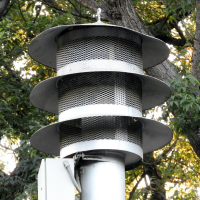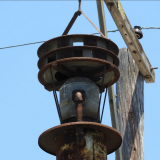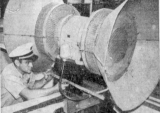Scream Master
| R.J. Zievers "Scream-Master" | |
 An inactive 7.5-horsepower Scream-Master, located in Sacramento, CA. Photo credit to CaliSirens00. | |
| Company | R.J. Zievers, Inc. |
|---|---|
| Produced | 1950s-1960s |
| Type | Omnidirectional Electromechanical |
| Sound output | 110-125 dB @ 100 ft |
| Frequency | 60 Hz |
| Horsepower | 7.5-20 hp |
| Voltage | 208-240 V AC 3 ph |
The Scream Master was a short-lived brand of sirens created by Robert J. Zievers, Inc, based out of La Verne, California. They were manufactured in the early 1950s as a local option for an omnidirectional air raid siren, with a rugged and low-maintenance design.
History and Design

The Scream Master was created in the 1950s by a company known as R.J. Zievers, Inc, operating out of La Verne, CA. Zievers was well known at the time for their wind machines, which included the "Frost-Master" wind machine, and the company was also known for producing heavy machinery. Due to being a small company, they never got to sell far beyond California. R.J. Zievers was a dealer for Federal Signal's products, including mounting Federal's 500-DHTT on Scream-Master mounts. Scream Masters were mainly sold in California, with several cities having large systems that featured these alongside Federal's 500-SHTT and SD-10, H.O.R.'s Siro-Drones, and BNCO Mobil Directos.
Scream Masters are incredibly simple in design, with the siren's motor, rotor and stator standing underneath a large mesh and steel shroud, held up by two arms on the stator, very similar to Federal's Model 5. They come with either 7.5 hp or 10 hp Square D Company AC motors running at 240 V AC, and came in two different configurations: 6/8-port dual tone, and 9-port single tone. The 7.5 hp model was rated between 110 and 115 dB at 100 ft, while the 10 hp model was rated at around 115 dB at 100 ft. The shroud is made of steel mesh, with two skirts to project both the rotor and intake sounds outwards, and a rainshield on top which keeps rain and debris out of the siren, and projects the intake sound. Like other sirens in California's CD systems, it came standard with a controller, maintenance basket, and large metal pole.


R. J. Zievers, Inc. was reported in a 1954 Civil Defense Administration report to have also produced a 20 hp dual headed rotational Scream Master siren that boasted 125 dB at 100 ft, heavily resembling the Federal Signal 500-DHTT. While at least a few of these were produced, and pictures exist of them, no rotating Scream Masters are known to exist today. They also produced a non-rotational variant of the siren.
While the Scream Masters proved to be very reliable sirens, R.J. Zievers Inc. just did not have the funding or resources to compete against Federal, and production of the Scream Master series of sirens ended by the late 1950s as the 500-SHTT and SD-10 proved to be more popular. Zievers himself died in April 1973, spelling the end of his company.
Unfortunately, all Scream Master sirens were disconnected by the 1980s, along with the rest of California's Cold War civil defense system. While a few have been removed due to construction, many still remain on their poles, waiting for the day that they'll see action again. Evidently, a few are still connected to power and in operational condition, as a 9-port Scream Master was set off in the middle of the night by a vandal. Despite having sat inactive for over 40 years, the siren fired up with no issues, proving how reliable these are. With none in private possession, the recording of the vandalized Scream Master is the only way we know what these sound like, and that is likely to remain the case for a long time. Little else is known about them. No recordings exist of a 6/8 Scream Master, or the 20 hp rotational.